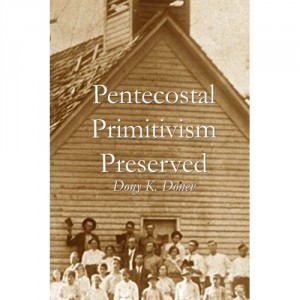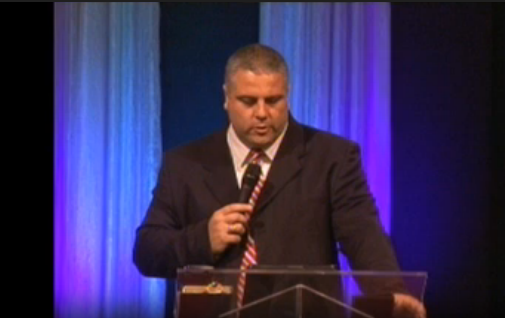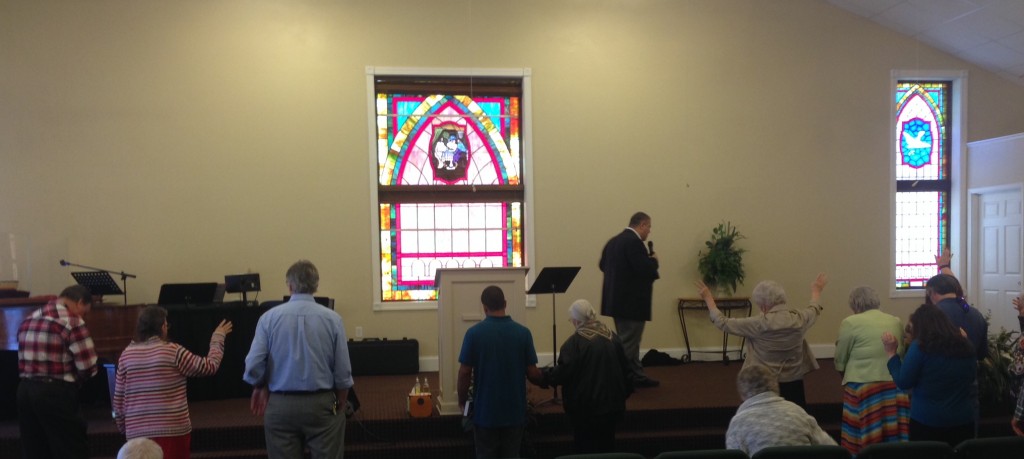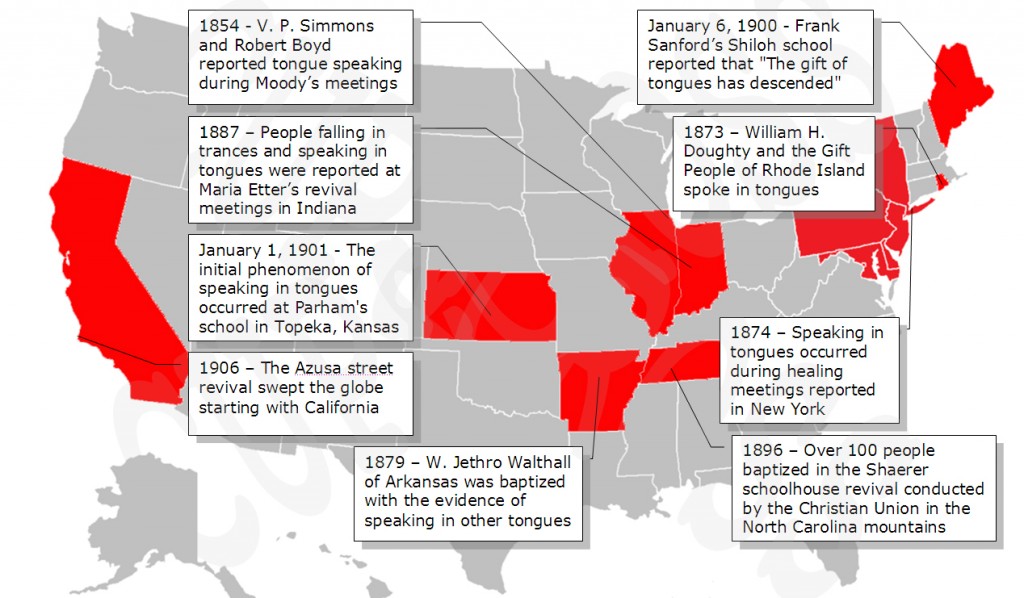110 Years ago, the Azusa Street Revival Began with a Fast

On April 6, 1906 William J. Seymour and the faithful few gathered with him at the Asberry house, decided to engage in a ten-day fast while waiting on the baptism in the Spirit. The first baptism with the Holy Spirit would occur just three days later. Seymour himself would be baptized on the sixth day of the fast and on the seventh, which was Good Friday, Seymour and his followers leased an abandoned church property at 312 Azusa Street and begin cleaning it up. Easter was on April 15, 1906 when they held their very first Pentecostal service at Azusa Street. The rest is history…
Ministering at Regional Church of God in Delbarton, WV

At Bread of Life Church of God in Byron, GA
New Socialist Attack on Religious Freedom in Bulgaria
 Over 26 years after the fall of the communist regime, the socialists left are reintroducing a new war against Christianity and religious freedom in Bulgaria. Two weeks after the introduction of draconian bill by George Kadiev, imposing full state control over believers and churches, the socialist parliamentary group filed in the registry of the National Assembly on March 14th a broader bill to restrict religious liberty in Bulgaria via government regulations according to which unregistered religions (faith confessions) have no right to:
Over 26 years after the fall of the communist regime, the socialists left are reintroducing a new war against Christianity and religious freedom in Bulgaria. Two weeks after the introduction of draconian bill by George Kadiev, imposing full state control over believers and churches, the socialist parliamentary group filed in the registry of the National Assembly on March 14th a broader bill to restrict religious liberty in Bulgaria via government regulations according to which unregistered religions (faith confessions) have no right to:
- Hold religious meetings;
- Create and maintain charitable or humanitarian institutions;
- Write, issue and disseminate religious publications;
- Have educational establishments;
- Collect and receive unsanctioned donations;
- Associate or confide with people and communities at home or abroad on subjects of religion and religious issues.
In practice, the new bill introduces a new form of compulsory registration of believers by the state. The left socialist legislators seek to repeal fundamental human rights enshrined in Bulgaria’s Constitution and the European Convention for the Protection of Human Rights and Fundamental Freedoms (ECHR), as follows:
- The right to freedom of thought (Art. 9 ECHR and Art. 37 CRB)
- The right of forming beliefs and the non-obligation to give information about one’s convictions (Art. 38 CRB, Art. 9 ECHR)
- The right to freedom of conscience and religion (Art. 9 ECHR Art. 37 CRB)
- Freedom of speech, press and media (Art. 40 CRB)
- Right of expression (art. 10 ECHR, Art. 39 CRB)
- Freedom to collect and disseminate information (Art. 41 of the CRB; Art. 10 ECHR)
- Freedom of assembly indoors without permission from the authorities (Art. 43 of the CRB, Art. 11 ECHR)
- The right to freedom and confidentiality of correspondence (Art. 34 CRB; cf. Art. 8 ECHR)
- Revocation of the right to freedom of association (art. 11 ECHR Art. 44 CRB).
In the unfortunate event that this bill passes under the law, it will impose, the already prohibited by the Constitution, obligatory state ideology. It will also violate separation between church and state, according to which the state cannot interfere in the internal life of churches and religious communities. Furthermore, in attempt to limit the freedom of the people, it will impose expressed governance and control of faith, beliefs and personal conviction; thus, endangering fundamental human rights and freedoms inherent to democracy.
The Past Decade of Chaplaincy in Bulgaria (2006-2016)
 February 16, 2006: Web presence and web identity created
February 16, 2006: Web presence and web identity created
February 21, 2006: Shall military chaplaincy be restored in the Bulgarian Army (publication in MediaPool – Bulgaria)
2006: Participant in the establishment of the Bulgarian Chaplaincy Association
August 19, 2006: Published Resolution No. 1 of the Bulgarian Chaplaincy Association
October 17, 2006: Conducted basic chaplaincy course for the Bulgarian Evangelical Theological Institute
December 2006: “The case of Underground Chaplaincy in Bulgaria,” research of the chaplaincy initiative in Bulgaria presented to the NATO’s Manfred Warner Foundation
March 2, 2007: Bulgarian Chaplaincy Association obtained legal status in Bulgaria and Europe
September 14, 2007: The US State Department of State reflected the Bulgarian Chaplaincy Association
July 13, 2008 Obtained accreditation for a Masters Degree in Chaplaincy Ministry
July 2009: Approved the “Master’s Program in Pastoral Care and Chaplaincy” with the Bulgarian Evangelical Theological Institute
June 2010: Lecture on “Military Chaplaincy” at First Evangelical Congregational Church in Sofia, Bulgaria
July 2010: Published “The beginnings of master’s chaplaincy training program” in the ARMY Bulgarian newspapers
August 2010: Cumulative update on Chaplaincy in Bulgaria
November 22, 2010: Held “Master’s Program in chaplaincy ministry” at the United Theological Faculty of the Bulgarian Evangelical Theological Institute
September 7, 2011: Published a LEGAL FRAMEWORK of CHAPLAINCY in BULGARIA
2012: Sponsored a new master’s program with focus on Social Services and Chaplaincy Ministry at St. Trivelius, alongside New Bulgarian University
More on the topic:
- Protestant Chaplaincy in Bulgaria
- Priests in the Bulgarian Army
- The printing of the camouflage New Testament in Bulgarian
- Visit of chief chaplain col. John Stefro
- Major General Bob Deese in Bulgaria
- Polish chief chaplain Mirono in Varna
Azusa Street Chronology 110 Years Ago…

JANUARY 2, 1906 William SEYMOUR ENROLLS in Charles PARHAM’S BIBLE TRAINING SCHOOL in Houston, Texas
FEBRUARY 1, 1906 During early February 1906, William J. Seymour receives an invitation from Mrs. Julia W. Hutchins to serve as pastor of the Holiness Church congregation she has founded in Los Angeles, California.
FEBRUARY 10, 1906 SEYMOUR LEAVES the BIBLE SCHOOL
FEBRUARY 22, 1906 William J. Seymour arrives in Los Angeles, California
FEBRUARY 24, 1906 Seymour preaches his first sermon as pastor of the Holiness Church at 9th Street and Santa Fe Avenue. He continues preaching on Sunday, February 25; Tuesday, February 27; and Friday, March 2, while holding meetings at 3 p.m. each afternoon.
MARCH 4, 1906 Seymour is LOCKED OUT of the church
MARCH 7, 1906 PRAYER MEETING at 114 SOUTH UNION STREET
MARCH 12, 1906 NIGHTLY MEETINGS BEGIN at 312 N. BONNIE BRAE St.
APRIL 6, 1906 The group at the Asburry house decides to engage in a 10-day fast while they pray for the baptism in the Spirit.
APRIL 9, 1906 FIRST BAPTISM IN THE HOLY SPIRIT IN LOS ANGELES
APRIL 12, 1906 William J. Seymour receives his baptism in the Holy Spirit and speaks in tongues.
APRIL 13, 1906 On Good Friday, Seymour and his friends lease the property at 312 Azusa Street and begin cleaning it up.
APRIL 15, 1906 SEYMOUR’S FIRST SERVICE AT 312 AZUSA STREET on EASTER 1906
APRIL 17, 1906 The LA TIMES INVESTIGATES
APRIL 18, 1906 At 5:48 a.m., San Francisco, California is rocked by an earthquake. During the next 4 days, the city burns. The first report on the Azusa Street Mission appears under the title, “Weird Babel of Tongues,” in the Los Angeles Daily Times. The Mission begins to grow.
APRIL 19, 1906 Los Angeles feels two earthquakes.
APRIL 21, 1906 BARTLEMAN WRITES “THE EARTHQUAKE!!!”
Diamonds in the Rough-N-Ready Pentecostal Series (Complete)

Speaking in Tongues in America Prior to the Azusa Street Revival of 1906
April, 1906 – The Azusa street revival swept the globe starting with California
January 1, 1901– The initial phenomenon of speaking in tongues occurred at Parham’s school in Topeka, Kansas
January 6, 1900 – Frank Sanford’s Shiloh school reported that “The gift of tongues has descended”
1896 – Over 100 people baptized in the Shaerer schoolhouse revival conducted by the Christian Union in the North Carolina mountains
1887 – People falling in trances and speaking in tongues were reported at Maria Etter’s revival meetings in Indiana
1874 – Speaking in tongues occurred during healing meetings reported in New York
1873 – William H. Doughty and the Gift People of Rhode Island spoke in tongues
1854 – V. P. Simmons and Robert Boyd reported tongue speaking during Moody’s meetings
FURTHER READING:
Church of God (Cleveland, TN)
- Alive, alive! (A personal testimony)
- Church of God Primitivism
- Bulgarian Church of God
- J.W. Buckalew
- Why revival came? by Dr. Charles Conn
Azusa Street Revival of 1906
- Lucy F. Farrow: The Forgotten Apostle of Azusa
- The FORGOTTEN ROOTS OF THE AZUSA STREET REVIVAL
- Azusa Street’s Apostolic Faith Renewed
- Azusa Street Sermons
- Pentecostal Primitivism Preserved
Prior to Azusa Street Revival of 1906
- First person to speak in tongues in the Assemblies of God was William Jethro Walthall of the Holiness Baptist Churches of Southwestern Arkansas
- The Work of the Spirit in Rhode Island (1874-75)
- Speaking in Tongues in America Prior to the Azusa Street Revival
- WAR ON THE SAINTS: Revival Dawn and the Baptism of the Spirit
- How Jezebel Killed One of the Greatest Revivals Ever
Speaking in Tongues in America Prior to the Azusa Street Revival of 1906 (Diamonds in the Rough-N-Ready Series)

The Azusa street revival swept the globe starting with California
January 1, 1901– The initial phenomenon of speaking in tongues occurred at Parham’s school in Topeka, Kansas
January 6, 1900 – Frank Sanford’s Shiloh school reported that “The gift of tongues has descended”
1896 – Over 100 people baptized in the Shaerer schoolhouse revival conducted by the Christian Union in the North Carolina mountains
1887 – People falling in trances and speaking in tongues were reported at Maria Etter’s revival meetings in Indiana
1874 – Speaking in tongues occurred during healing meetings reported in New York
1873 – William H. Doughty and the Gift People of Rhode Island spoke in tongues
1854 – V. P. Simmons and Robert Boyd reported tongue speaking during Moody’s meetings
Diamonds in the Rough-N-Ready Pentecostal Series (Renewed)
Lucy F. Farrow: The Forgotten Apostle of Azusa

Lucy F. Farrow was born in Portsmouth, VA. Unfortunately, her origins there have not been yet fully traced. Her involvement appeared around the summer of 1905 while working as governess in Parham’s home in Houston.
While in Houston, Farrow met Charles Parham, who came there from Baxter Springs, Kansas, in October 1905 and held meetings in Bryan Hall. Parham was preaching about the earlier outpouring of the Holy Spirit that had occurred in his Bethel Bible College in Topeka, Kansas, in January 1901.
Other sources claim, Lucy F. Farrow received the Holy Ghost a little bit earlier on September 6, 1905 after Parham opened up a month-long meeting in Columbus, Kansas. Along with Parham she witnessed events unfold in Zion, Illinois, where John Alexander Dowie was faltering.
Lucy Farrow was the niece of renowned black abolitionist Frederick Douglass. She was serving as pastor of a holiness church in Houston in 1905 when Charles Parham engaged her to work as a governess in his home. Farrow carried the Pentecostal embers back to Texas, on to her home state Virginia and later to Liberia. Her aptitude for igniting the supernatural gifts among others was evident at a 1906 camp meeting near Houston when some 25 seekers stood lined up in a row in front of her. When Farrow “laid hands upon them…many began to speak in tongues at once.”
Although William J. Seymour is acknowledged as the leader of the Azusa Street Revival, it was a black woman, Lucy Farrow, who provided the initial spark that ignited that revival. About the time when Seymour departed to Los Angeles in January of 1906, Lucy Farrow and J. A. Warren also arrived there independently. Other sources claim, they had been sent by Parham to help Seymour with his meetings.
Seymour began his meetings at the Santa Fe Mission on February 24, 1906 but was quickly shut down by the pastor Julia W. Hutchins on March 4, 1906 after a consultation with the South Californian Holiness Association.
The meetings then moved to 214 Bonnie Brae St., home of Richard and Ruth Asberry. As a result, Edward S. Lee was the first one was baptized in the Spirit and spoke in other tongues in the late afternoon when William J. Seymour and Lucy F. Farrow laid hands on him for healing at his house. At 7:30 p.m., the group went back to Bonnie Brae for the evening meeting and before the night was over, Jennie Evans Moore and several others joined him.
It has been said that no one associated with the prayer meeting led by Seymour had spoken in tongues until Farrow, at Seymour’s request, arrived on the scene and began laying her hands on people and seeing God fill them with the Holy Spirit as in the book of Acts. She also ministered with power across the southern United States and in Liberia in West Africa. She lived out her final years in Los Angeles, where there were reported healings and remarkable answers to prayer through her ministry.









